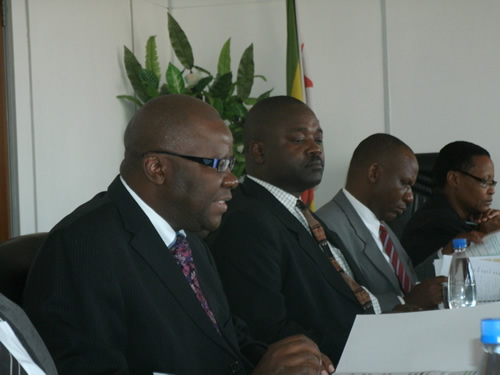Archive for September, 2011
Zimbabwe media project wins new media award
Friday, September 30th, 2011 by Tina RolfeThe 15th Highway Africa Conference, was held at the Cape Town International Conference Center from 17-19 September 2011. This event is arguably the largest gathering of media practitioners in Africa and seeks to stir debate and discussion on journalism and new media.
For 11 years, these unique awards within the profession of journalism on the continent, reward pioneering, innovative and creative use of technology in journalism and the media.
The Awards were established to recognise African innovation in the area of digital media and to highlight the role that digital technologies play in journalism and the media at large.
The conference, which follows events in the Arab region where social media has been highlighted as playing a pivotal role in the revolution, saw delegates exploring other ways in which social media and other technological tools can be used to tackle global issues such as global warming and the millennium development goals.
Freedom Fone was awarded the SABC-Telkom Highway Africa New Media Award in the Non-profit category.
We are proud our initiative has been recognized regionally and are encouraged by the global interest shown in the platform, with downloads in over 48 countries to date.
Pictured above: Tich Sigauke accepts the award for Freedom Fone.
Keeping memories
Friday, September 30th, 2011 by Bev ClarkFrom Flavorwire:
London photographer Miranda Hutton found the parents through support groups and bereavement websites. Some immaculately maintained the rooms as they were on the day their child died, dusting under the teddy bears, up-keeping a pristine time capsule for years. Others let the dust gather around the picture frames and shelves, sealing the untouched room in with its memories or began to let go, slowly transforming the unoccupied spaces into guest rooms, storage places — even an art studio. Shot from the doorway, because as she explained to Vice, “it felt a little less intrusive that way,” Hutton’s poignant Rooms Project documents stages of grief and the loaded significance of rooms and possessions left behind. Visit the rooms in our gallery.
Zimbabwe’s 2012 budget strategy
Friday, September 30th, 2011 by Upenyu Makoni-MuchemwaThe Minister of Finance, Tendai Biti, held a press conference this week announcing the dates for public consultative meetings to be held around the country by his ministry. Presentations and comments from these will inform the rationale in formulating the 2012 budget strategy.
He announced that the Ministry of Finance and Economic Planning would be using a different fiscal position for the 2012 budget. Factors informing his ministry’s decision to implement a different strategy included the 2010 Global economic crisis which was entering a second round this year and the need for a budget which better served the needs of the Zimbabwe people.
During his address the minister stated that only 33% of government expenditure went towards meeting the needs of the Zimbabwean people. The remaining 67% was consumed in providing wages for the civil service, which currently numbers at 235 000 people.
The minister lamented the lack of a common vision for Zimbabwe among politicians in the inclusive government. ‘There is a Kwashiorkor of common vision,’ he said. Other issues he mentioned were the slow pace of reforms, and the slow pace of implementation of resolutions made by even the smallest governmental unit.
The 2012 budget will focus on the following:
Job creation
Macro-economic growth and stability
Maintaining inflation levels and interest rates
A planned special emphasis on the education sector
The ministry will hold public consultative meetings with all relevant stakeholders including specialised bodies and organisations from all sectors of the economy, including retailers, bankers and government and donor entities. The meetings have intentionally been scheduled to begin in Southwest Zimbabwe, a region which, historically, has been neglected by the fiscal authority.
The 2012 Budget Strategy paper will be unveiled in parliament on Tuesday 4 October.
We defeated the dictator not the dictatorship
Friday, September 30th, 2011 by Upenyu Makoni-MuchemwaFrom Pambazuka:
Peter Wuteh Vakunta seems convinced that with his book ‘Defeating dictators: Fighting Tyranny in Africa and Around the World’, George B. N. Ayittey has written ‘a blueprint for oppositional militancy, a veritable modus operandi for undoing dictators in the contemporary world’. He thinks it is a must read for every student of African politics.
All too often, opposition parties that set out to liberate their countries from tyranny wind up selling out, fighting among themselves and sowing seeds of discord. Some opposition leaders are themselves closet dictators, exhibiting the same dictatorial tendencies they so loudly denounce in the dictators they are eager to replace. Ayittey sounds a note of admonition to Africa’s opposition political parties: ‘No single individual or group by itself can effect political change. It takes a united opposition or alliance of democratic forces’.
The prime objective of any bona fide opposition group or groups should be to get rid of the dictatorial regime. Once this task has been accomplished, the opposition can then establish a level political playing field. All other issues such as who the new president should be, what the new flag or national currency should look like are distractions; they are irrelevant and secondary. These issues are divisive and nothing delights a despotic leader more than a divided opposition. The opposition has to be conscious of the fact that the dictator may infiltrate their ranks by planting moles among them with the intention of destroying the opposition. Such moles, Ayittey suggests, ‘need to be tracked down and squashed’. A smart strategy would be to identify the props of the despotic regime and sever them methodically, one at a time.
Last but not least, to defeat a tyrant in an election, a coalition of opposition parties must field only one presidential candidate. Once a coalition of opposition forces has been cobbled together, the second imperative should be to lay down the rules of combat. The first rule is to know the enemy – the type of dictator (civilian or military), how he operates, his strengths and weaknesses. Then, it is incumbent on the oppositional coalition to devise effective counter-strategies and modalities for defeating the despotic leader. Most importantly, the language of the opposition must be devoid of zealotry, incensed ideology, ethnocentrism and elitism.
Read the full article here













